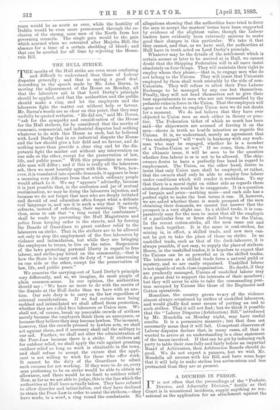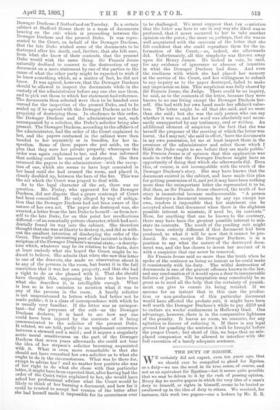A DUCHESS IN PRISON.
IT is not often that the proceedings of the "Probate, Divorce, and Admiralty Division," fertile as that Court is in sensational incidents, supply anything .so sen- sational as the application for an attachment against the Dowager Duchess ( f Sutherland on Tuesday. In a certain cabinet at Stafford House there is a mass of documents bearing on the kuit which is proceeding between the Dowager Duchess and the present Duke. It was repre- sented to the Court, on behalf of the Dowager Duchess, that the late Duke wished some of the documents to be destroyed after his death, and, further, that she felt sure, from what she knew of their contents, that the present Duke would wish the same thing. Sir Francis Jeune naturally declined to consent to the destruction of any document on a mere statement by one of the parties to the cause of what the other party might be expected to wish if he knew something which, as a matter of fact, he did not know. It was agreed, however, that the Dowager Duchess should be allowed to inspect the documents while in the custody of the administrator before any one else saw them, and to pick out those to which her statement had reference. The documents thus selected were then to be handed over unread for the inspection of the present Duke, and to be sealed up if he agreed with the Dowager Duchess as to the propriety of destroying them. In obedience to this order, the Dowager Duchess and the administrator met, each accompanied by a solicitor, the Duke's solicitor being also present. The Dowager Duchess, according to the affidavit of the administrator, had the order of the Court explained to her, and the papers contained in the cabinet were then handed to her separately or in bundles, for her in- spection. Some of these papers she put aside, on the plea that they were her private property, whereupon the order was again explained to her, and she was informed that nothing could be removed or destroyed. She then returned the papers to the administrator—with the excep- tion of one, which she seems to have kept concealed in her hand until she had crossed the room, and placed it, closely doubled up, between the bars of the fire. This was the act which the Court was prayed to deal with. As to the legal character of the act, there was no question. Mr. Finlay, who appeared for the Dowager Duchess, did not dispute that a grave contempt of Court had been committed. He only alleged by way of mitiga- tion that the Dowager Duchess had not been aware of the nature of her own act. The paper she destroyed was, she averred, a letter from the late Duke to herself—or from her- self to the late Duke, for on this point her recollections differed—of an essentially private character, which had acci- dentally found its way into the cabinet. She therefore thought that she was at liberty to destroy it, and did so with- out the smallest intention of disobeying the order of the Court. The really interesting part of the incident is this de- scription of the Dowager Duchess's mental state,—a descrip- tion which, whatever may be its relation to the facts, does at least embody what she hoped the Court might be in- duced to believe. She admits that when she saw this letter in one of the drawers, she made no observation about it to any of the persons in the room, but burnt it in the full conviction that it was her own property, and that she had a right to do as she pleased with it. That she should have thought this, supposing the letter to have been what she describes it, is intelligible enough. What is less so is her omission to mention what it was to any of the persons in the room. A family solicitor is not unaccustomed to letters which had better not be m. ade public ; it is a class of correspondence with which he is usually very familiar. If the letter was as unimpor- tant—for the purposes of the suit—as the Dowager Duchess declares, it is hard to see how any one could have been injured by the contents of it being communicated to the solicitor of the present Duke. It related, we are told, partly to an unpleasant occurrence between a steward and a maid ; and it argues a singularly acute moral sensitiveness on the part of the Dowager Duch. ess that seven years afterwards she could not bear the idea of her stepson's solicitor becoming acquainted with it. What is even more remarkable is that she should not have consulted her own solicitor as to what she ought to do in the circumstances. What was he there for, except to advise her ? and no matter how positive she was of her right to do what she chose with that particular i letter, t might have been expected that, after having had the order of the Court twice explained to her, she would have asked her professional adviser what the Court would be likely to think of her burning a document, and how far it could be trusted to accept her version of the letter after she had herself made it impossible for its correctness ever to be challenged. We must suppose that 1. er conviction that the letter was hers to use in any way she liked was so profound, that it never occurred to her to take another opinion on the point ; the more so, perhaps, that she was so well acquainted with the contents of the letter that she felt confident that she could reproduce them for the in- formation of the Court,—as, indeed, she afterwards did. Unfortunately, all this simplicity was thrown away upon Sir Henry James. He looked in vain, he said, for any evidence of ignorance or absence of intention in what the Dowager Duchess had done. And even the readiness with which she had placed her memory at the service of the Court, and her willingness to submit to any inquiry as to the paper destroyed, failed to make any impression on him. This scepticism was fully shared by Sir Francis Jeune, the Judge. There could be no inquiry, he said, as to the contents of the letter, because they were known to no one living except the Dowager Duchess her- self. She had with her own hand made her affidavit value- less. The letter might be all that she said, and no more than she said ; but she was the only person who can say whether it was so, and her word was absolutely and neces- sarily unsupported by any testimony, oral or written. An additional element of suspicion is the fact that she was herself the proposer of the meeting at which the letter was burnt. 'As I may not,' she said in effect, 'have the documents in my own possession, let me at least inspect them in the presence of the administrator and select those which I think the Duke ought to see before they are made public.' Sir Francis Jenne is of opinion that this application was made in order that the Dowager Duchess might have an opportunity of doing that which she afterwards did. Even this, of course, is not incompatible with the truth of the Dowager Duchess's story. She may have known that the document existed in the cabiuet, and have made this plan for getting possession of it, and yet it may have been nothing more than the unimportant letter she represented it to be. But then, as Sir Francis Jeune observed, the truth of her story is immaterial because undiscoverable. "A person who destroys a document unseen by any eye except her own, renders it impossible that her statement can be accepted about that document when there is the slightest possible interest to misstate, if need be, its contents." Here, for anything that can be known to the contrary, there may have been the greatest possible interest to mis- state its contents. The result of the pending suit might have been entirely different if that document had been produced, to what it will be now that it cannot be pro- duced. No one, except the Dowager Duchess, is in a position to say what the nature of the destroyed docu- ment was, and she has chosen to invest her account of it with a suspicion that can never be removed. Sir Francis Jenne said no more than the truth when he spoke of the sentence as being as lenient as he could make it consistently with his duty. The wilful destruction of documents is one of the gravest offences known to the law, and any condonation of it would open a door to innumerable failures of justice. The temptation may conceivably be so great as to need all the help that the certainty of punish- ment can give to ensure its being resisted. If we assume for an instant that in this case the produc- tion or non-production of this particular document would have affected the probate suit, it might have been well worth the Dowager Duchess's while to pay £250 and to endure six weeks' confinement in Holloway Gaol. One advantage, however, there is in the comparative lightness of the penalty. It leaves no room, we conceive, for any agitation in favour of reducing it. If there is any legal ground for quashing the sentence it will be brought before the proper Court ; but short of this, we hope that no mis- placed compassion will be allowed to interfere with the full execution of a barely adequate sentence.







































 Previous page
Previous page